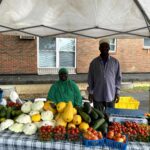Skip to content
Employee profile: Amir Hussein
This column will appear in The Record this week.
 My family knows how to move. We relocated from Somalia to Kenya in 1999 and, after five years in a refugee camp, from Kenya to the United States in 2004. You would think that would be enough moving for one family. But in 2006 we moved again from Tennessee to Kentucky just so we could carry on our heritage of farming.
My family knows how to move. We relocated from Somalia to Kenya in 1999 and, after five years in a refugee camp, from Kenya to the United States in 2004. You would think that would be enough moving for one family. But in 2006 we moved again from Tennessee to Kentucky just so we could carry on our heritage of farming.
Sure, there is plenty of farmland in Tennessee. But not much of it is available to refugee families like mine. My mother’s and father’s families both had farmed for centuries. In Africa their families had lots of property where they grew rice to sell at market. For us, like so many families resettling in America, farming was a cultural thing passed down through the centuries. And we were about to lose that.
That’s why my parents were eager to move here to participate in a program that made large garden plots available to refugee farmers. Here we could continue our heritage of farming while growing foods that we loved but weren’t available to us, like roselli, African ear wig, and African eggplant. Plus, we could save money by growing our own vegetables.
 Today I work with Common Earth Gardens, an outreach of Catholic Charities of Louisville that makes plots of land available to those resettling here as refugees. Here our new American neighbors can grow foods that they want and need while hanging on to the culture that has shaped them. And so much more.
Today I work with Common Earth Gardens, an outreach of Catholic Charities of Louisville that makes plots of land available to those resettling here as refugees. Here our new American neighbors can grow foods that they want and need while hanging on to the culture that has shaped them. And so much more.
You’ll have to picture one of our 14 acres of garden sites to really understand the “so much more” part. Imagine famers from Burma working their land using the age-old traditions of their families. Next to them, a family from Somalia is doing the same. Soon, they are sharing practices with each other, tilling the other’s plot as a favor, and sharing herbal mixtures to repel unfamiliar insects. It’s amazing to see the relationships that build among people who don’t even speak to each other in an understandable manner. They don’t have to speak the same language; they just know each other.
At Common Earth Gardens, we also offer a three-year program that helps interested farmers to develop a business selling their produce at local markets, setting up CSAs, or selling to retailers. In addition to learning more about farming in Kentucky, they learn about things like taxes and marketing. You can find these growers at markets throughout metro Louisville.
Most growers offer vegetables common to Kentucky but also sell produce common to their homelands that you can’t find anywhere else in Louisville. Interestingly, when you buy these items, like bitter melon from a Burmese farmer, you are eating the fruit of seeds that have been harvested and passed along from generation to generation and brought with these farmers to America. One man told me of carrying his seeds in his hat for his entire journey!
Since moving here from Tennessee, my family has completed the business program with Common Earth Gardens and expanded from one to three garden sites, where we still grow favorites from Africa as well as American standards like squash, zucchini, watermelon, kale, and collards. You can find us, the Bakar Family Farm, and other farmers at our website, cclou.org/common-earth-gardens. Click on the “Meet Your Farmer” tab.
People who relocate to America as refugees get a small sliver of regular life, and the rest is hardship. I’m so happy to help them grow what they grew in their homeland and experience what they experienced in their homeland through my work with Common Earth Gardens.
Page load link
 My family knows how to move. We relocated from Somalia to Kenya in 1999 and, after five years in a refugee camp, from Kenya to the United States in 2004. You would think that would be enough moving for one family. But in 2006 we moved again from Tennessee to Kentucky just so we could carry on our heritage of farming.
My family knows how to move. We relocated from Somalia to Kenya in 1999 and, after five years in a refugee camp, from Kenya to the United States in 2004. You would think that would be enough moving for one family. But in 2006 we moved again from Tennessee to Kentucky just so we could carry on our heritage of farming. Today I work with Common Earth Gardens, an outreach of Catholic Charities of Louisville that makes plots of land available to those resettling here as refugees. Here our new American neighbors can grow foods that they want and need while hanging on to the culture that has shaped them. And so much more.
Today I work with Common Earth Gardens, an outreach of Catholic Charities of Louisville that makes plots of land available to those resettling here as refugees. Here our new American neighbors can grow foods that they want and need while hanging on to the culture that has shaped them. And so much more.